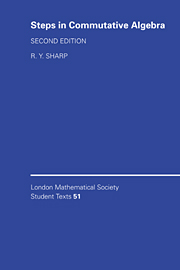Book contents
- Frontmatter
- Contents
- Preface to the 1st Edition
- Preface to the 2nd Edition
- 1 Commutative rings and subrings
- 2 Ideals
- 3 Prime ideals and maximal ideals
- 4 Primary decomposition
- 5 Rings of fractions
- 6 Modules
- 7 Chain conditions on modules
- 8 Commutative Noetherian rings
- 9 More module theory
- 10 Modules over principal ideal domains
- 11 Canonical forms for square matrices
- 12 Some applications to field theory
- 13 Integral dependence on subrings
- 14 Afflne algebras over fields
- 15 Dimension theory
- 16 Regular sequences and grade
- 17 Cohen–Macaulay rings
- Bibliography
- Index
12 - Some applications to field theory
Published online by Cambridge University Press: 06 January 2010
- Frontmatter
- Contents
- Preface to the 1st Edition
- Preface to the 2nd Edition
- 1 Commutative rings and subrings
- 2 Ideals
- 3 Prime ideals and maximal ideals
- 4 Primary decomposition
- 5 Rings of fractions
- 6 Modules
- 7 Chain conditions on modules
- 8 Commutative Noetherian rings
- 9 More module theory
- 10 Modules over principal ideal domains
- 11 Canonical forms for square matrices
- 12 Some applications to field theory
- 13 Integral dependence on subrings
- 14 Afflne algebras over fields
- 15 Dimension theory
- 16 Regular sequences and grade
- 17 Cohen–Macaulay rings
- Bibliography
- Index
Summary
Much of the remainder of this book will be concerned with the dimension theory of commutative Noetherian rings. This theory gives some measure of 'size’ to such a ring: the intuitive feeling that the ring K[X1, …, Xn] of polynomials over a field K in the n indeterminates X1, …, Xn has, in some sense, ‘size’ n fits nicely into the dimension theory. However, to make a thorough study of the dimension theory of an integral domain R which is a finitely generated algebra (see 8.9) over a field K, it is desirable to understand the idea of the ‘transcendence degree’ over K of the quotient field L of R: roughly, this transcendence degree is the largest integer i ∈ ℕ0 such that there exist i elements of L which are algebraically independent over K, and it turns out to give an appropriate measure of the dimension of R. Accordingly, in this chapter, we are going to develop the necessary background material on transcendence degrees of field extensions.
Thus part of this chapter will be devoted to the development of fieldtheoretic tools which will be used later in the book. However, there is another aspect to this chapter, as its title possibly indicates: in fact, some of the ideas of Chapter 3 about prime ideals and maximal ideals, together with results like 5.10 and 5.15 concerned with the existence of algebra homomorphisms in situations involving rings of fractions, are very good tools with which to approach some of the basic theory of field extensions, and in the first part of this chapter we shall take such an approach.
- Type
- Chapter
- Information
- Steps in Commutative Algebra , pp. 220 - 242Publisher: Cambridge University PressPrint publication year: 2001



